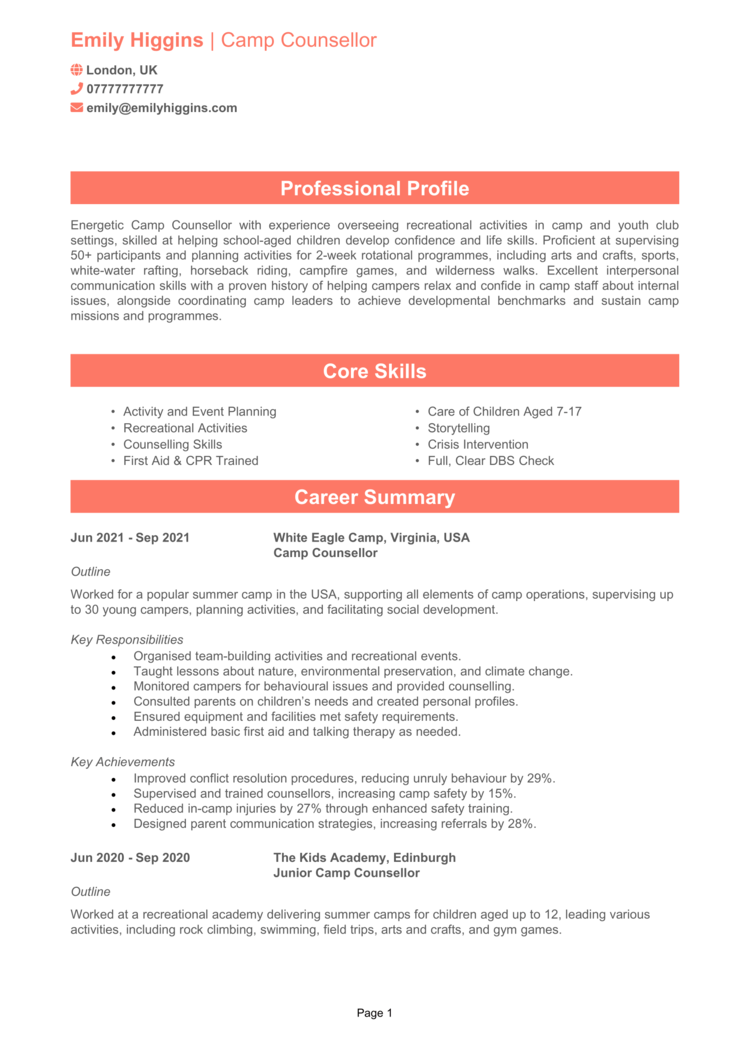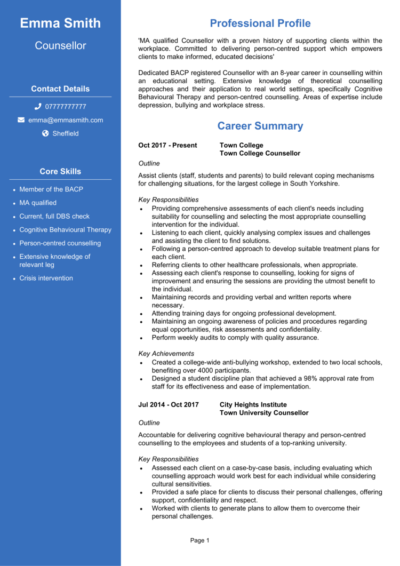A counselling job is a noble role – you’ll need to be a compassionate listener who can help others navigate life’s many challenges.
It can be a very rewarding role, but it will require an especially strong CV to prove to recruiters that you’re the one they can rely on for such an important job.
This guide, and 4 Counsellor CV examples, will help you craft an application that connects with employers and opens up a new role for you.
Counsellor CV example

Camp Counsellor CV example

Counselling Psychologist CV

Student Counsellor CV example

How to write your Counsellor CV
Learn how to create your own interview-winning Counsellor CV with this simple step-by-step guide.
This guide will take you through everything you need to write a Counsellor CV, from your training and therapeutic approach to your ability to support clients effectively. You’ll have a CV that reflects both your qualifications and your passion for helping others.
Counsellor CV structure


Think of your CV as a carefully planned therapy session – it needs structure and purpose if it’s going to make an impact. Just as clients appreciate a clear path forward, so do recruiters when they’re navigating your application.
Here’s how to structure your Counsellor CV:
- Name and contact details – Personal details go right at the top, visible to recruiters right away. Including a photo is optional, and generally not done.
- CV profile – Begin with a concise summary of your counselling expertise, therapeutic style, and career highlights.
- Core skills – List your most relevant abilities, such as active listening, cognitive behavioural therapy (CBT), and client assessment. Focus on hard, tangible skills.
- Work experience – Outline your past roles in reverse order, focusing on your contributions and successes.
- Education – Show off the academic qualifications, professional training, and certifications in counselling or psychology which you’ve earned.
- Additional info – Use this optional space to mention hobbies and interests, professional memberships, or specific client groups you specialise in
Counsellor CV format


Your CV format should be as supportive as your counselling approach. A messy or unclear layout will leave recruiters feeling lost, but a well-presented CV will guide them to exactly what they need – just like a great therapist does.
Formatting tips for a Counsellor CV:
- Bullet points – These let the recruiter pick out the key bits with ease.
- Divide sections – Logically organise the information and make it simple and pleasant to navigate.
- Use a clean font – Opt for readability with a professional font and consistent formatting.
- Keep it under 2 pages – Aim for 2 pages: too long would start to bore the recruiter, and this is plenty of space to list the important details
How to create a Counsellor CV profile


Your CV profile is your chance to show you’ve listened to the recruiter’s needs, and that you’ve got the right approach. This short section should convey your ability to provide empathetic support and deliver effective therapeutic interventions, while maintaining professionalism at all times.
Tailor your profile to the job by focusing on your relevant experience, training, and the types of clients or challenges you specialise in.
Counsellor CV profile examples
Profile 1
Empathetic Counsellor with five years of experience providing mental health support to individuals and groups in clinical settings. Skilled in CBT, mindfulness techniques, and active listening to help clients navigate personal challenges. Proficient in maintaining detailed client records and adhering to ethical counselling standards.
Profile 2
Dedicated Counsellor with three years of experience specialising in adolescent and family therapy. Adept at fostering trust with clients, facilitating group sessions, and developing tailored intervention plans. Skilled in using therapeutic frameworks such as person-centred and solution-focused therapy.
Profile 3
Experienced Counsellor with over eight years in private practice, focusing on trauma, grief counselling, and emotional resilience. Expertise in guiding clients through life transitions using integrative approaches. Skilled in using case management software to track progress and outcomes effectively.
What to include in your Counsellor CV profile
Tailor your profile to the job by focusing on your relevant experience, training, and the types of clients or challenges you specialise in.
Here’s the sort of thing to include in your Counsellor CV profile:
- Where you’ve worked – Mention the types of settings you’ve counselled in, such as schools, private practice, or community organisations.
- Your top qualifications – Highlight certifications like BACP accreditation or a degree in Counselling or Psychology.
- Therapeutic approaches – Include modalities like CBT, person-centred therapy, or trauma-focused techniques.
- Client groups you’ve worked with – Reference experience with children, families, or specific populations like veterans or at-risk youth.
- Outcomes and goals – Mention your ability to help clients achieve measurable progress in their mental health or personal development.
Show off the core skills recruiters look for


The core skills section is your chance to showcase the abilities that make you an effective and compassionate Counsellor. Highlight technical and interpersonal skills that demonstrate your expertise and client focus.
Most important skills for your Counsellor CV
- Active Listening – Building trust by truly hearing and understanding clients’ concerns.
- Cognitive Behavioural Therapy (CBT) – Using evidence-based techniques to help clients address negative thought patterns.
- Client Assessment – Conducting thorough evaluations to identify needs and create tailored support plans.
- Crisis Intervention – Providing immediate support during acute emotional or mental health crises.
- Case Management – Coordinating care with other professionals to ensure comprehensive support for clients.
- Empathy and Rapport Building – Establishing a safe, non-judgmental space for clients to share openly.
- Conflict Resolution – Mediating disputes and fostering effective communication between parties.
- Group Therapy Facilitation – Leading sessions to address shared challenges and encourage peer support.
- Progress Monitoring – Tracking client achievements and adjusting approaches as needed.
- Ethical Practice – Adhering to professional standards and maintaining confidentiality at all times.
How to present your work experience on your CV


Now for your CV’s main act: your work experience section is where you demonstrate your proven track record in supporting clients and achieving positive outcomes. Focus on roles that have showcased your counselling expertise and adaptability.
List your roles in reverse chronological order. If you’re newer to the field, include internships, volunteering, or academic placements that highlight transferable skills.
How to structure jobs

- Outline – Provide a brief overview of the organisation, your role, and the client groups you worked with.
- Responsibilities – Highlight tasks like conducting assessments, leading therapy sessions, or liaising with other professionals. Use action verbs like “facilitated,” “developed,” or “implemented.”
- Achievements – Include measurable outcomes, such as improved client satisfaction, reduced wait times, or successful completion of support plans. Numbers and specifics help demonstrate your impact.
Example jobs for Counsellor
Counsellor | Petersfield Clinic
Outline
Provided individual and group counselling services at a community mental health clinic, supporting clients with anxiety, depression, and relationship issues. Focused on creating a safe and supportive environment for clients to explore personal challenges.
Responsibilities
- Conducted initial assessments to understand client needs and develop tailored treatment plans.
- Provided therapeutic interventions using CBT and mindfulness-based approaches.
- Facilitated weekly group therapy sessions on stress management and self-esteem.
- Maintained accurate and confidential records in compliance with data protection regulations.
- Collaborated with psychiatrists and social workers to ensure holistic client care.
Achievements
- Improved client outcomes by 30% through consistent use of evidence-based techniques.
- Received commendation from clinic management for exceptional empathy and client rapport.
- Successfully led a group therapy programme that reduced participant anxiety levels by 20%.
Counsellor | BestMind Clinic
Outline
Specialised in family and adolescent counselling at a private practice, supporting clients through complex interpersonal and developmental challenges. Focused on building trust and fostering healthy communication.
Responsibilities
- Worked with adolescents and families to resolve conflicts and improve relationships.
- Applied solution-focused and person-centred therapy to address client goals.
- Facilitated workshops on communication skills and emotional regulation.
- Developed action plans in collaboration with clients, monitoring progress regularly.
- Referred clients to external support services when necessary to ensure comprehensive care.
Achievements
- Increased family therapy success rates by 25% through innovative session approaches.
- Successfully ran a six-week adolescent confidence-building programme with 95% positive feedback.
- Recognised by colleagues for creating a warm and welcoming practice environment.
Counsellor | Better You
Outline
Provided trauma and grief counselling in a private practice setting, supporting individuals in processing loss and building emotional resilience. Focused on long-term recovery and personal growth.
Responsibilities
- Conducted in-depth assessments to identify trauma-related symptoms and develop therapy plans.
- Used integrative approaches, including EMDR and mindfulness, to facilitate healing.
- Maintained up-to-date case notes and tracked client progress using case management software.
- Designed and delivered workshops on coping strategies for grief and loss.
- Participated in professional development to stay informed on advancements in trauma therapy.
Achievements
- Helped 80% of clients achieve significant improvements in coping mechanisms within six months.
- Increased client retention by 15% through personalised follow-ups and engagement strategies.
- Recognised for delivering impactful grief workshops, attracting over 100 participants annually.
Education and qualifications


The education section is vital for a Counsellor, as it demonstrates your foundational knowledge and specialised training. Include any professional certifications and academic qualifications.
List qualifications in reverse chronological order. For newer candidates, emphasise coursework, research projects, or clinical placements that align with the role you’re applying for.
Best qualifications for Counsellors
- BACP Accreditation – Professional recognition by the British Association for Counselling and Psychotherapy.
- Level 4 Diploma in Therapeutic Counselling – Covers essential counselling skills and practical experience.
- Bachelor’s Degree in Counselling or Psychology – Provides foundational knowledge of human behaviour and therapeutic approaches.
- Mental Health First Aid Certification – Demonstrates ability to support individuals in immediate distress.
- CBT Practitioner Certificate – Validates expertise in a widely-used evidence-based therapy.





